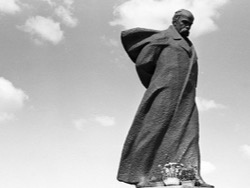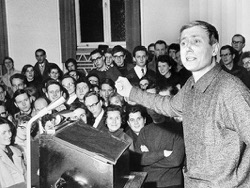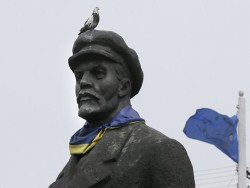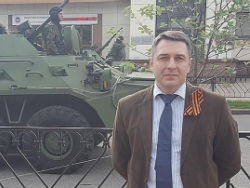
The revolution of Dignity and subsequent events moved the issue of differences between Ukraine and Russia from the realm of the metaphysical in the practical sphere.
Why events such as the Maidan of late 2013 — early 2014 became possible in Ukraine, but still unthinkable in the Russian case? Among popular variants of the answer to this question, from economic to geopolitical — often forgotten about the differences in the sources of modern Russian and Ukrainian cultures.
Take, for example, a key figure for contemporary Russian and Ukrainian literature — Alexander Pushkin and Taras Shevchenko.
Portraits of Shevchenko became one of the symbols of the Revolution of Dignity: they can be seen and in the camp, the host, on Khreschatyk street and on stage during a folk Veche. Lines from his poem “Kavkaz” (1845) quoted speakers on Independence square and the speakers were placed on the banners of protesters.
The link between the poetry of Shevchenko and the Revolution of Dignity is indirectly confirmed by the increased interest in this poet in the West.
Sharp disputes about the quality of various translations of “Kobzar” in English a few years ago interested in only a limited number of literary critics and not the General public as it is today.
At the same time it is difficult to imagine mass protests in Russia against government policy under the slogan, taken from the works of Pushkin.
In any case, links to a key figure of modern Russian literature during the last mass anti-government mobilization in Russia in December 2011 was observed. Quotes by Rudyard Kipling and reproductions of paintings “the Scream” by Edvard Munch please. But not the poems of Pushkin.
The point here is hardly the particularities of the biographies of the poets. Both suffered enough from power. More significantly, the major themes in the works of two great poets.
Shevchenko’s idea of the struggle with untruth, injustice has become Central to the work (“Barasa — conquer”). After the first plan was the theme of love and honor. “Love honor and be loyal” — these lines from “Ruslan and Lyudmila” can be considered a kind of motto of the poet.
Considering the Central role of Pushkin and Shevchenko in Ukrainian and Russian cultures, respectively, this difference in emphasis, it should be borne in mind for understanding the subsequent evolution of these crops on increasingly divergent trajectories.
To test assumptions about the difference of accents made Shevchenko and Pushkin, the totality of their work was subjected to content analysis. As keywords were used the words which the inhabitants of modern Russia and Ukraine is most often associated with human dignity.
A list of these words was determined using an online survey that I conducted in two countries in December 2015. The panel size in Russia amounted 5068 people, in Ukraine — 902 (plus 52 people interviewed by telephone by staff of the Kiev international Institute of sociology).
Analysis of relative frequency of occurrence of key words in the works of Shevchenko and Pushkin shows that the most typical of the first are “will power”, “civility”, “decency”, “kindness”, “honesty” and “understanding”. Whereas the works of Pushkin peculiar emphasis on “honor”, “pride”, “loyalty”, “conscience”, “love” and “mind.”
Mention will power, without which the struggle by and large impossible, Pushkin no. On the contrary, Shevchenko’s willpower is one of the key themes.
“Don’t cry, heart, has me
, power, and freedom”
(Mar Jan-Cernica, 1841)
“The truth overcame,
Asmali Your glory,
I force, I will”
(Retik, 1845)
“Remember and never forget that a woman is a Holy, inviolable thing and so seductive that no power of the will is unable protivostoit this seduction” (the Artist, 1856)
The opposite situation with honor. Both the poet use this word, but judging by its relative frequency, the concept of honour plays a more important role for Pushkin, and because, probably, and for Russian culture in General.
“Full of anger, full of revenge,
Without mind, without senses, without honor”
(Arakcheeva, 1820)
“Slave of honor ruthless,
Near he saw his end”
(Prisoner of the Caucasus, 1821)
“Obedient to me, my power is strong;
In her happiness, my glory”
(The avaricious knight, 1830)
“Honor” is a very ambiguous word. In contrast to related concepts of human dignity and human rights, honor precludes universal interpretation.
Honor requires constant balancing and determine who has more and who has less. Honor does not happen a lot and most of all, she can’t be all without exception.
In societies and social groups where honor in price, you need to constantly be on the alert. Not affected its honor? How to adequately answer is not sufficient, in the opinion of the person or group, a privilege?
If the “attack” on honor left unanswered, then this inevitably leads to the marginalization of committing infamy. So “attacks”, real or imagined, accepted “answer”.
Become a “slave of honor” in such conditions it is easy (to them, according to the estimate of Mikhail Lermontov “Death of a poet”, ultimately became the Pushkin).
Examples of societies in which considerations of honor priority, many. This traditional North African society, described by Pierre Bourdieu, and the South of Italy, known as the Motherland of the mafia. Explorer mafia Pino Arlacchi points directly to one of its sources — competition for the possession of a greater honor.
If Russian culture really is one where much depends on the concept of honor, it becomes clear constanttrend to see “insufficient privilege” as in the all-Russian relations and Russian perspective on international politics.
The main task then becomes constant figuring out who is “cooler”. Both inside the country and abroad.
The Russians (those of them who agree to become a “slave of honor”) and especially their leaders (who see themselves as “the best”) totally overlooked the point that not all perceive the world solely through the prism of honor.
In a relationship there may be other priorities. For example, human dignity, returned to the political agenda in Ukraine in 2013-2014.
Conflicts, perceived exclusively through the prism of honor, rule out a compromise solution. The winner can be only one side — the one with “more honor”, which is “cooler”. This also applies to the conflict in the East and South of Ukraine.
The conflicts in which come to the fore other concerns (human dignity or human rights, for example), leave the hope of finding a mutually acceptable solution.
That’s why it so important to eliminate the perception of these conflicts solely through the prism of honor — first Ukrainian negotiators, and then (via the reformatting of the agenda), possibly Russian.
First, it will be closer to the specific character of Ukrainian culture as different from Russian. Secondly, it potentially will allow to break the impasse with the future of those territories.
If such arguments are accepted, then it is worth thinking not only about the reformatting of the agenda of the talks, but also about how the domestic media coverage of the conflict in the East and South.
A more productive emphasis on honor (saving or loss), and on respect for the dignity of all directly involved parties, including the population of Donetsk, Lugansk regions and Crimea, temporarily not controlled by Ukrainian government.
Unlike the preservation of honor, respect for the dignity of all directly involved parties is possible.








